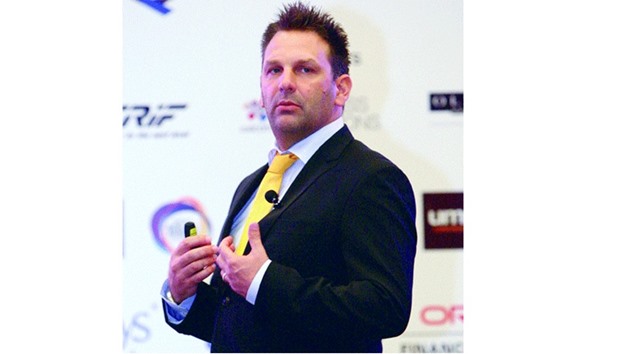Tech-savvy millennials, who represent about 40% of the market in the Gulf and the Middle East region, are helping shape the future of digital banking in the GCC, according to industry leaders.
“They (millennials) are the driving force behind that change – they want an ‘Amazon experience’ with their banks. That’s what they are looking for, and this entitles structural architecture change the way banks operate, said Temenos regional marketing manager Middle East & Africa Nihal Abughattas, who spoke to Gulf Times on the sidelines of the Mena New Age Banking Summit yesterday.
“This is absolutely a big challenge for banks. Even though all the banks speak digital, it takes a lot more than just having Internet banking or mobile banking to say that you are digital.
“Digital does not mean that you can check your balance on your mobile. Digital means you can do all types of banking transactions on your mobile on near real time and having that transparency by being able to know what’s happening with your request,” she pointed out.
Also speaking at the event, Emirates NBD head of Multichannel & CRM Retail Banking Pedro S Cardoso said: “Millennials are a unique customer group that will drive the future of all industries.” Citing the ‘Millennials Insight Report’, Cardoso described millennials as “more demanding,” “more value oriented,” “less wary of privacy,” and “more optimistic.”
But because millennials “do not see their bank as lifestyle-enabling,” Cardoso stressed that “banks have to move swiftly to capture the opportunity.” A report by Oracle said millennials only see banking as transactional: Sixty percent feel their banks are a safe place to keep money, 31% believe their banks help them manage personal finances, and only 9% feel that banks help support their lifestyle.
According to Cardoso, the report also said 88% of millennials believe that “banks are still the most trusted source for advice on personal finances.” Also, millennials are beginning to adopt non-bank options such as alternative payment providers (40%, millennials; 36% non-millennials); mobile wallet (19%, M; 7%, NM); and mobile money (11%, M; 4%, NM).
In the GCC, Cardoso said millennials are “a large, influent and increasingly affluent generation brought up with digital technologies.”
Citing a report by Visa, Cardoso said: “GCC millennials are disproportionally important – accounting for a quarter of the population. They are the fastest growing segment. They tend to be higher spenders than global peers and they are driving the surge in e-Commerce.”
He added: “They are a curious, sociable, tech-savvy population, whose use of technology is deeply embedded in their lives. They are drawn to digital channels to save time, for more convenience, and to buy goods and services, which are not available locally.
However, “with a desire for speed and convenience,” the report further said: “They tend to be frustrated by the online experience offered by many GCC banks and merchants. They are looking for frictionless payments, mobile-responsive websites, intuitive navigation, and engaging rewards.”
But at the same time, Cardoso emphasised that these issues provide GCC banks an opportunity to capture the millennials market by enhancing customer experience through digitalisation.
“We have tremendous opportunity as banks to capture […] if you think about the variables, there’s a market opportunity,” he said.

Emirates NBD head of Multichannel & CRM Retail Banking Pedro S Cardoso describes millennials as more demanding, more value oriented, less wary of privacy and more optimistic. PICTURE: Nasar T K

